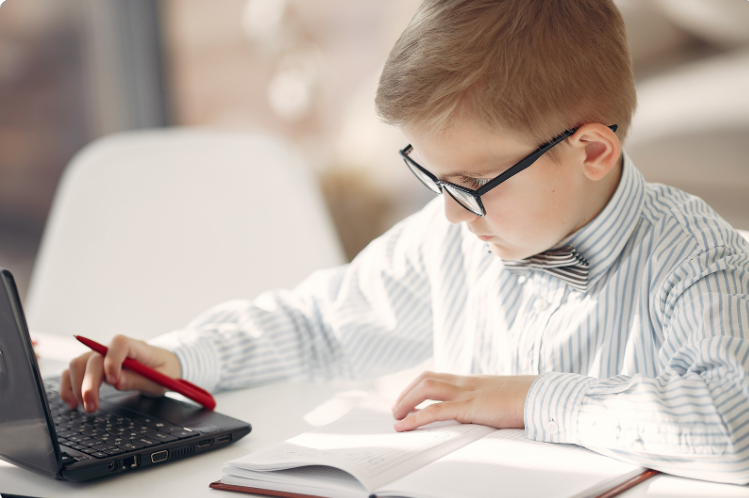Orange became a bad word in our household when my son was in kindergarten. From a very early age, orange was always his favorite color. Everything had to be orange – his clothes, his candy, his ice pops, you name it. Then he started kindergarten. His classroom used a color system to help identify how the day had gone. Green meant he had had a really good day, yellow meant that it was generally an ok day, and red meant that it had been a really rough day. Then, there was the dreaded orange. In his eyes, orange was this strange purgatory that he couldn’t get out of, no matter how hard he tried. He knew that red was only one short misstep away and then he would be headed for a trip to see the principal.
He knew that there were certain expectations for his behavior, both at home and at school. Being sent to the principal was definitely not on the list. At this young age, he had already figured out that there was a connection between home and school, and his ability to earn certain privileges at home was determined by his teacher’s marker color in his folder at the end of the day. He was stuck between a rock and a hard place. And frankly, so were we as his parents.
We knew that he was generally a good kid. He had always loved preschool and been successful. We were all lost as to why this year was so different. He went from being the kid begging to go to school, even on weekends and holidays, to the kid who basically had to be dragged out the door kicking and screaming. He regularly complained, “I hate school!” What was happening to our precocious and eager-to-learn EVERYTHING kid?
It wasn’t until a bit later in his educational career that we learned that he was Twice Exceptional (or 2E). According to the Child Mind Institute, these kids are “identified as gifted in certain areas, like math or music, but who also have a learning or developmental challenge, like ADHD, dyslexia, or autism (https://childmind.org/article/twice-exceptional-kids-both-gifted-and-challenged).” In his case, he was academically quite gifted, but he was also diagnosed with Attention-Deficit Hyperactivity Disorder, Predominantly Combined Type (or ADHD).
Twice Exceptional??? What the heck does that mean?
Many characteristics are twice exceptional. However, like everything else when it comes to kids, no 2e kid looks the same. Here is some of what we look for:
- High intelligence or talent in specific areas: 2e children often exhibit exceptional abilities in particular areas, such as math, music, art, or language. They may demonstrate a curiosity or aptitude for learning that leads to advanced problem-solving skills or a deeper understanding of complex concepts. These kids need more challenges academically.
- Learning Disabilities or differences: Despite being significantly above average intellectually, 2e children generally struggle in some other area that impacts their academic performance. Conditions such as dyslexia, ADHD, autism spectrum disorders, or sensory processing issues can significantly impact learning or academic success. You might see these concerns pop up in difficulties with reading, writing, attention/concentration, or social interaction for example.
- Inconsistencies in academic performance: Do you ever wonder why your child is off the charts in one academic area and hanging on by a thread in another? You know that s/he has the intellectual capacity to understand the subject matter, but it just isn’t clicking. These kids tend to excel in the areas that are aligned specifically with their strengths and interests but struggle in areas that require skills or abilities impacted by their disabilities.
- Difficulty with organization, time management, and completing tasks: These are skills that fall under the category of executive functioning. 2e children struggle with such tasks. They seem to find it really challenging to prioritize tasks, maintain focus, and follow through on assignments. Thus, they end up with incomplete work, completed work that was never turned in, and academic underachievement in general.
- Heightened sensitivity to environmental stimuli: Does your child ever complain that everything is too loud? Maybe to the point that he is covering his ears? Perhaps, textures really bug him? Goodness knows that sock line can really be a pain. 2e kids are often extremely aware of environmental stimuli. Noise, lights, textures, and social interactions can really be too much. This leads to feeling overwhelmed and anxious or even super uncomfortable. As a result, their ability to concentrate, engage, or participate in activities can become negatively impacted.
- Intense passions and interests in niche subjects: Sure, 2e kids have areas that might be challenging for them, but they also frequently display intense passions and interests in specific areas of interest. They can talk your ear off forever but don’t always catch on that you might not care nearly as much about it as they do.
Well, now what…How do we help and support our 2E child?
Given that there are so many complexities to raising a Twice Exceptional child, it seems more like a constant game of zigging and zagging than just child-rearing. Oftentimes, you think that you finally get the hang of it, and bam the 2e kiddo throws another monkey wrench into the mix. As my son got older, it became a very delicate balance between nurturing his talents and interests, supporting him through his unique learning and developmental challenges, and continuing to help him grow into a fully functioning responsible adult.
Since there is no one specific answer, here are some practical tips and strategies that we learned along the way.
- Identify and Understand His Strengths and Challenges: It is essential to take the time to recognize, support, and celebrate the areas in which your child excels. When we only focus on areas of weakness and struggle, we miss the big picture of what makes our truly exceptional child exceptional. While it is important to offer guidance and redirection for those areas of struggle, a true balancing of strengths will help to foster a positive self-image and self-confidence.
- Provide Individualized Support: Because it is a known fact that 2e kids are gifted, the adults around them often forget that they still struggle in various areas as well. Just like any other child, they have unique patterns of strengths and weaknesses which require unique strategies to meet their learning needs. This might include differentiated instruction, personalized learning plans, or even accommodations like extra time for assignments, preferential seating, or sensory-friendly classroom environments.
- Build Executive Functioning Skills: Executive functioning skills include skills such as time management, self-control organizational skills, and the ability to complete tasks. 2e children often really struggle with these skills. As a result, they will need to be taught and then practiced. S/He may benefit from having tasks broken down into more manageable steps or even having visual or auditory cues to support understanding and task completion. It is easy to lose sight of the fact that the child’s high level of intelligence would seemingly dictate that task completion should be super easy, but realistically task completion and organizational skills are major weaknesses.
- Promote Self-Advocacy: Encourage your child to express their needs politely and respectfully, but also seek help when needed. Helping them learn to communicate effectively increases both independence and confidence.
- Create a Supportive Environment: Unfortunately, 2e kiddos spend a lot of time feeling like they don’t fit in, or they don’t belong. Like any other child, they benefit from a nurturing and understanding environment at home and school. Your 2e child needs to feel validated, reassured, and a sense of belonging and acceptance.
- Collaborate with Professionals: You know your child best. Your child needs you to collaborate with all the major players (e.g., teachers, therapists, counselors, other professionals, etc) in his day-to-day life. Together, you all can develop comprehensive support plans, resources, and interventions specific to your child’s needs. You must be your child’s voice, especially when your child’s voice is not enough.
By working together, implementing these strategies, and fostering a supportive and inclusive environment, your child can and will thrive. Together, we can help them reach their full potential and celebrate their unique gifts and talents.
Over the years, my son has had the opportunity to truly experience incredible support from a handful of teachers, friends, and family. While it hasn’t all been smooth sailing, he has learned to truly embrace who he is, explore and build on his strengths, and figure out his path for the future.
We are proud of the man he has become. He has worked hard and has figured out his way. We do not doubt that he will accomplish whatever goal he sets his mind. It may not be the easy path or even the recommended path, but he will get there.
In the end, it is important to remember that parenting a 2e child is not just about raising an incredible person, but it is also about discovering the endless love, resilience, and hope within us all. And, let’s be honest, raising children is not for the faint of heart, no matter 2e or not! We are all in this together.
Oh, and by the way….the favorite color is now PINK!
If you can relate to the challenges and joys of raising a Twice Exception child and you are looking for additional guidance and support, schedule your free consultation now to learn how we can work together to develop a plan to nurture your child’s unique strengths and overcome their challenges. Let’s connect and take the steps toward success together!






